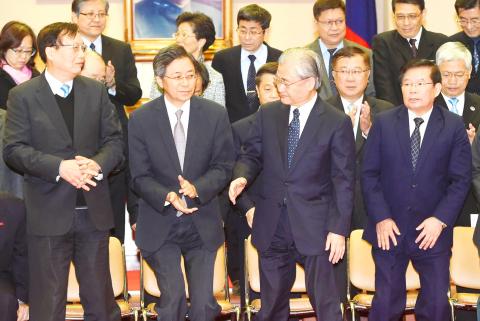Premier Mao Chi-kuo (毛治國) yesterday said the Cabinet, under his leadership, was resigning en masse, even though President Ma Ying-jeou (馬英九) said earlier in the day that he would not accept the resignation at this time.
Mao, who was appointed premier in late 2014, following the Chinese Nationalist Party’s (KMT) crushing defeat in local government elections, walked out of a special Cabinet meeting yesterday without taking questions.
Mao’s resignation came after the KMT lost both the presidential and legislative elections on Saturday, a matter of course in Taiwan when a ruling party loses a major election.

Photo: Liao Chen-huei, Taipei Times
Vice Premier Simon Chang (張善政) said that Mao is to take some time off, and Chang is to lead the Cabinet and other ministers until Ma decides whether to accept the Cabinet’s resignation.
Before Mao convened the special meeting, Ma went to Mao’s residence but did not find him there. Ma left after asking Mao’s wife to convey a message asking Mao to stay on.
The KMT offered to allow the Democratic Progressive Party (DPP) to form a Cabinet before its chairperson, president-elect Tsai Ing-wen (蔡英文), is sworn in on May 20, but the proposal appears to have been shot down.
In a post-election news conference late on Saturday, Tsai said that she would leave the issue of letting the party that holds the legislative majority form a Cabinet to constitutional procedure.
Taiwan’s Constitution does not allow for a Cabinet and a head of state from different parties.
Ma, whose second presidential term ends on May 20, yesterday said he is asking Tsai to reconsider her decision.
Meeting former deputy US secretary of state William Burns, Ma said it is necessary for the DPP to form a new Cabinet soon.
Meanwhile, Presidential Office spokesman Charles Chen (陳以信) yesterday said that Ma directed Presidential Office Secretary-General Tseng Yung-chuan (曾永權) to form a task force to prepare for the political transition.
The task force is to assign the transfer to a transition team designated by Tsai in accordance with related laws and regulations and based on the two previous power transitions in Taiwan, Chen said.
Tseng convened a meeting yesterday morning to begin preparations for the third transfer of power in Taiwan’s democratic history, Chen added.
The task force was formed to coordinate with the incoming administration to ensure a smooth transition of power in the four-month period between the election and the inauguration of the new president on May 20.

INVESTIGATION: The case is the latest instance of a DPP figure being implicated in an espionage network accused of allegedly leaking information to Chinese intelligence Democratic Progressive Party (DPP) member Ho Jen-chieh (何仁傑) was detained and held incommunicado yesterday on suspicion of spying for China during his tenure as assistant to then-minister of foreign affairs Joseph Wu (吳釗燮). The Taipei District Prosecutors’ Office said Ho was implicated during its investigation into alleged spying activities by former Presidential Office consultant Wu Shang-yu (吳尚雨). Prosecutors said there is reason to believe Ho breached the National Security Act (國家安全法) by leaking classified Ministry of Foreign Affairs information to Chinese intelligence. Following interrogation, prosecutors petitioned the Taipei District Court to detain Ho, citing concerns over potential collusion or tampering of evidence. The

‘FORM OF PROTEST’: The German Institute Taipei said it was ‘shocked’ to see Nazi symbolism used in connection with political aims as it condemned the incident Sung Chien-liang (宋建樑), who led efforts to recall Democratic Progressive Party (DPP) Legislator Lee Kun-cheng (李坤城), was released on bail of NT$80,000 yesterday amid an outcry over a Nazi armband he wore to questioning the night before. Sung arrived at the New Taipei City District Prosecutors’ Office for questioning in a recall petition forgery case on Tuesday night wearing a red armband bearing a swastika, carrying a copy of Adolf Hitler’s Mein Kampf and giving a Nazi salute. Sung left the building at 1:15am without the armband and apparently covering the book with a coat. This is a serious international scandal and Chinese

Seventy percent of middle and elementary schools now conduct English classes entirely in English, the Ministry of Education said, as it encourages schools nationwide to adopt this practice Minister of Education (MOE) Cheng Ying-yao (鄭英耀) is scheduled to present a report on the government’s bilingual education policy to the Legislative Yuan’s Education and Culture Committee today. The report would outline strategies aimed at expanding access to education, reducing regional disparities and improving talent cultivation. Implementation of bilingual education policies has varied across local governments, occasionally drawing public criticism. For example, some schools have required teachers of non-English subjects to pass English proficiency

TRADE: The premier pledged safeguards on ‘Made in Taiwan’ labeling, anti-dumping measures and stricter export controls to strengthen its position in trade talks Products labeled “made in Taiwan” must be genuinely made in Taiwan, Premier Cho Jung-tai (卓榮泰) said yesterday, vowing to enforce strict safeguards against “origin laundering” and initiate anti-dumping investigations to prevent China dumping its products in Taiwan. Cho made the remarks in a discussion session with representatives from industries in Kaohsiung. In response to the US government’s recent announcement of “reciprocal” tariffs on its trading partners, President William Lai (賴清德) and Cho last week began a series of consultations with industry leaders nationwide to gather feedback and address concerns. Taiwanese and US officials held a videoconference on Friday evening to discuss the